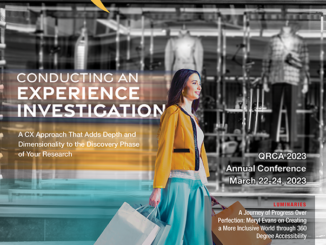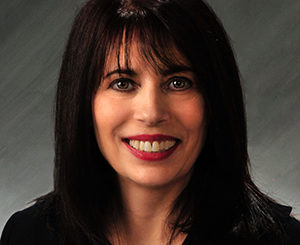Dear Emeritus,
Our world is so divisive, and productive discussions among people with varying perspectives seem harder and harder to come by. The optimist in me keeps thinking that the skills I’ve honed as a qualitative researcher might be able to help encourage more civility and understanding. Are there ways quallies can use our unique professional skills to positively impact our fractured society for the better?
Thank you,
Optimistic in Omaha
Dear Optimistic in Omaha:
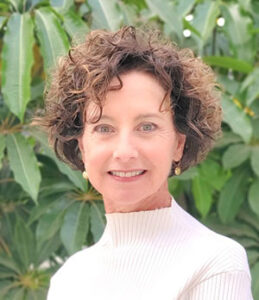 Cris Bain-Borrego Responds
Cris Bain-Borrego Responds
Qualitative researchers are skilled at nonjudgmental listening, knowing how to probe without leading, getting at deep-rooted feelings, and creating productive discussions among groups of people with varying perspectives.
Even before I heard it coined by our dear Naomi Henderson (see sidebox on next page), the phrase “unconditional positive regard” has been the cornerstone of what I consider skillful and effective moderation. As an example, with younger groups, I often begin the conversation with an ice breaker by asking, “What’s your favorite color?” to a few participants; then, I turn to the group and ask, “Who’s right?” The ice breaks, the group smiles, and the atmosphere immediately softens.
As moderators, we look for ways to create safe spaces where opinions are offered without fear of judgment. By openly asking our participants to speak with humility and listen with respect, we encourage people to share their thoughts freely, so that we can paint a picture of the tapestry of varying perspectives on every topic under the sun. It’s time to take these skills to town halls, school board meetings, community centers, and nonprofit organizations so that society learns to listen with respect and speak with humility.
Cris Bain-Borrego
Owner, CBB Bilingual Qualitative Research, Inc.
cris@cbbresearch.com
Dear Optimistic in Omaha:
 Jeff Gartner Responds
Jeff Gartner Responds
Yes, it does seem that our American society is indeed fractured. I work 50-50 qual/quant, so here are some data points to help set the context:
- Seventy percent of Americans agree with the statement that America has become so polarized that it can no longer solve the major issues facing the country—and that those differences will only continue to grow. (NBC News, 2022)
- Sixty-six percent say when discussing issues with those with whom they disagree, people are “quick to attack them.” Only 24 percent say people are “quick to listen.” (Listen First Project, 2021)
- Thirty-two percent say division has made it difficult to get along with friends or family. (Ipsos, 2021)
It’s the last data point that’s especially sad. People choose to break their relationships with family and friends over political and social issues? Really? Apparently so.
On a more personal level, I’ve witnessed the vehemence of this divisiveness and incivility in my own work with public school districts over the past five years. I conduct community research with students, teachers, and parents to bring their voices into their school district’s strategic planning. Questions on gender in the screener or in a survey provoke vitriolic comments from respondents when the response choices include more than just male and female.
So, what can we do? How can we use our professional qualitative research expertise to reduce divisiveness and help people talk with their family and friends about more than just the weather?
One thing we can do is join and lend our assistance to one of the several hundred nonprofit organizations already committed to encouraging and enhancing civil communications between people of varying perspectives. Many of these organizations belong to the Listen First, Bridge Alliance, and America Talks networks.
Almost two years ago, a QRCA friend and colleague, Cris Bain-Borrego, and I joined one of these organizations, The Great Reset Community Roundtables. We help The Great Reset with its monthly Zoom small group discussions by writing their discussion guides and moderating or providing active training when others take the lead moderator role. It’s amazing (but really not surprising as qualitative researchers) when the participants open up and respectfully share what’s in their hearts when they know others are respectfully listening to them. We also know how to defuse a situation when a participant tries to push the boundaries of respect for others.
Jeff Gartner
Owner, Marketing Strategist, and
Marketing/Community Researcher
Gartner & Associates LLC
jeff@gartnermarketing.com
Dear Optimistic in Omaha:
 Merrill Shugoll Responds
Merrill Shugoll Responds
Qualitative researchers encourage people to articulate their thoughts and feelings about products, services, and critical issues. Learning how people think and feel helps us better understand consumer behavior so we may affect and modify behaviors to achieve the desired resolutions to our most vexing problems. Qualitative consultants can use their unique professional skills by volunteering our services to explore and understand community, local, national, and international issues. If we have not already done so, each of us should select an issue near and dear to our hearts and apply our skills to glean insights to help us and others generate ideas for ways to address complex issues.
Qualitative researchers could pair our moderating/facilitation/research skills with mediation skills by obtaining additional training or partnering with a trained mediator. The skills of a mediator are similar, except that a mediator strives to help the parties arrive at a conclusion. The purpose would be to take the information gleaned from the moderated sessions and sort through differences between parties involved in any difference of opinion or dispute to find common ground to ascertain a solution. The mediator assists and guides the parties toward their own resolution. The mediator does not decide the outcome but helps the parties understand and focus on the critical issues needed to reach a resolution.
As qualitative consultants, we are:
- Naturally curious, wanting to learn or know more about something or someone. We want to know why people think the way they do.
- Active listeners who want to understand the lives and needs of others.
We work to understand rather than simply hear what another person is saying by being fully present, not just listening to respond. It is also important not to hold any preconceived expectations or outcomes. Good listeners do not jump in to give advice and do not interrupt. We ask follow-up questions and listen more than we speak. We show that we are listening by using active body language. - Adept at creating safe environments, which includes making sure people know there is no such thing as a wrong answer. This encourages strangers from diverse backgrounds to interact and learn from each other. We appreciate when diverse opinions emerge, and we should prohibit criticism of others for these views, and explain that if consensus is not achieved, that is perfectly okay.
- Impartial, open, and unbiased. Our personal beliefs are not important in our work and should not be used to influence the outcome.
- Flexible and comfortable going with the flow. Our discussion guides are structured to cover the critical issues and not permit participants to stray too far afield, but are flexible enough to give participants the space they need to express themselves.
- Excited to explore complex, controversial, or uncomfortable subjects, issues, and topics, and analyze the results that may or may not achieve a single or amenable solution.
- Willing to draw conclusions based on the findings articulated in the discussions about the issue.
In general, qualitative researchers are not negotiators or peacemakers. Therefore, pairing our skills with the skills of trained mediators might be the optimal solution for positively impacting our fractured society for the better.
Merrill Shugoll
President, Shugoll Research
mshugoll@shugollresearch.com
Dear Optimistic in Omaha:
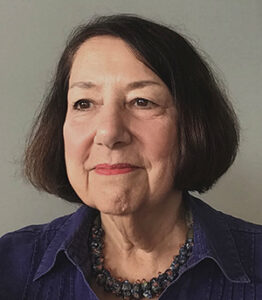 Dona Vitale Responds
Dona Vitale Responds
One of the easiest things we, as individuals, can do is adopt the old bumper-sticker slogan, “Think Globally, Act Locally.”
I love to discuss politics and issues in the news, and I’m always curious to learn how others are reacting to this week’s controversy. I’m lucky to have a lot of people close to me who enjoy engaging in political and social issues. Some share my point of view on most things, but I’m even more interested in learning what casual acquaintances and strangers have to say about topical concerns when they disagree with me.
No matter who you’re talking to, it’s important to go into “moderator mode” as soon as a sensitive topic seeps into the conversation. Take a breath and remind yourself that your interest is to find out what others have to say, not to convince them of what you believe. Remember to show unconditional positive regard—even if all you can manage is a neutral comment like “that’s interesting” or “I hadn’t heard that before” when someone says something you think is totally false or outrageous. Ask neutral questions to probe deeper. That can be enlightening for both you and your “respondent.” A simple “what makes you say that,” when someone expresses a knee-jerk reaction or repeats an opinion pulled directly from cable news, can make them stop and think, and perhaps even realize that what they just said doesn’t make sense. Those moments eventually lead to actual dialogue that helps uncover common ground and open minds.
Remember, it’s a small victory for civility when someone who’s expressed an opinion totally different from yours can say, “I see what you’re saying” or “I hadn’t thought of that.” Of course, when you gain new insight into another person’s point of view, remember to use those phrases yourself. If we could all kick into “moderator-mode” in our personal conversations, we might help make the world a better place to engage, share perspectives, and learn from one another.
Dona Vitale
Retired Market Research Consultant
(Strategic Focus, Inc.)
Author of Consumer Insights 2.0
dona.vitale@gmail.com
Dear Optimistic in Omaha:
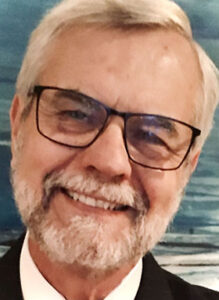 Greg Rathjen Responds
Greg Rathjen Responds
You are not alone in your concerns, and yes, it does make sense that qualitative skills could make a difference. In fact, the QRCA Emeritus SIG has been discussing this topic for almost two years now. When it comes up in our monthly Zoom meetings, it triggers a wide range of points of view. Most are optimistic, like you, that we can and should try to do something with our unique facilitation skills. Everyone pretty much agrees that the tools we employ could facilitate civil discourse:
- We probe pat answers and expected reactions to get at the deeper feelings and motivations that drive opinions and behavior.
- We create an atmosphere of unconditional positive regard, enabling the safe expression of true views (even when they differ from the rest of the group).
- We help people express emotions, impressions, and subconscious reactions using visuals, metaphor, projective questioning, laddering, and other techniques.
- We handle awkward moments, divisive reactions, sensitive topics, and difficult people in various situations and circumstances.
Figuring out how to share these skills to have a positive impact on our societies can be a challenge. Rather than just talk about it, QRCA’s Emeritus SIG decided to take action. We created “The QRCA Listening Project” to explore how QRCA might be able to, using your words, “positively impact our fractured society for the better.” The project team set about doing a deeper dive into the topic, exploring other organizations committed to improving civic discourse (there are hundreds!), reviewing the literature on the topic (there are volumes), and strategy planning.
QRCA’s VIEWS winter 2022 issue will feature an update on “The QRCA Listening Project” and provide additional insights on qualitative practices for positive social change, led by Cris Bain-Borrego, Jeff Gartner, Lynn Greenberg, Greg Rathjen, Dona Vitale, and Michele Zwillinger. Stay tuned, and reach out to any of us if you’d like to get involved!
Greg Rathjen
Owner and Principal Emeritus
Marketecture Market Research
marketecture2@comcast.net


